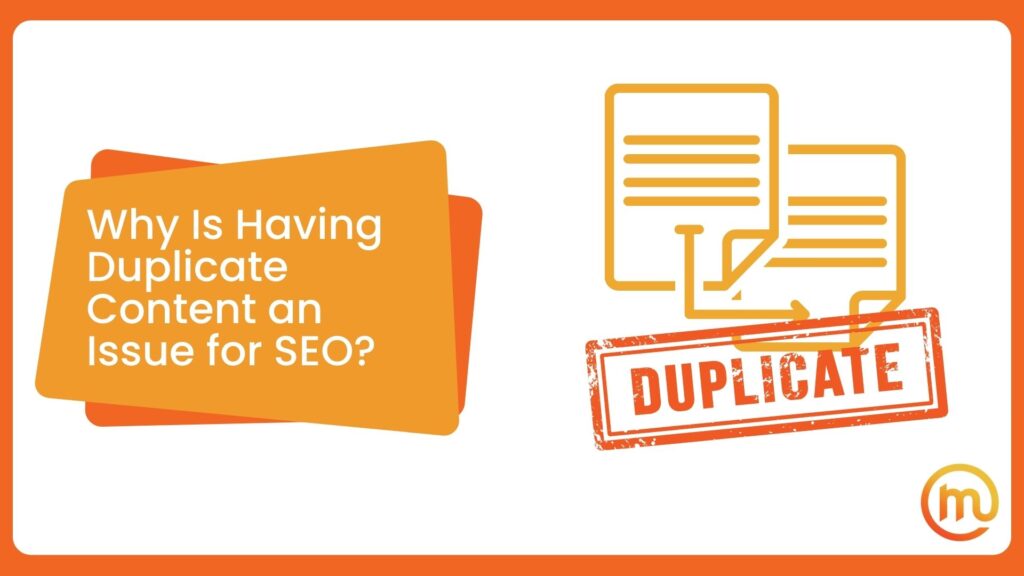In the SEO world every digital step counts, and duplicate content stands as a formidable obstacle to achieving high rankings. It can perplex search engines and hinder their ability to determine which pages should be prominently featured in search results. Join us in combating this pervasive problem, ultimately revealing the path to an optimized online presence.
What Is Duplicate Content?
Duplicate content is a block of text that refers to identical or very similar content appearing on multiple web pages, either within the same website (internal) or across different sites (external). In terms of SEO, these blocks of text can have a significant negative impact.
The internal type encompasses blocks of text that are uniquely duplicated within a single website. In this case, the duplicated text is exclusive to that particular domain and is published across multiple pages within that domain.
The external type pertains to content duplicated across various domains on the internet. That’s why when a website owner or an SEO marketing agency comes across similar content, it’s essential to tackle this issue to boost search engine performance.
How Does It Impact SEO?
It confuses search engines, making it harder for them to determine the most relevant page to display in results. This can result in lower search rankings for the affected pages, reducing their visibility and traffic. To maintain a strong SEO presence, it’s crucial to address and mitigate these issues effectively.
Did you know that nearly 30% of websites have duplicate blocks of text and are facing major issues caused by them? In fact, one of the most common SEO issues is similar blocks of text, besides images without title and alt attributes, too short or too long meta descriptions, and links without anchor text.

Unfriendly and Undesirable URLs in a Search Result
With Google’s EEAT update, quality content, and how URLs are presented play a crucial role in the ranking scalability. Of course, a trustworthy website development agency will take care of everything for you, but having some knowledge about it will only do you good.
Just consider the scenario where a single page is accessible through three distinct URLs. Ideally, the first URL should appear in search results. However, Google can occasionally make errors. In such cases, less user-friendly URLs might replace the intended one. The consequence of this is that due to the presence of an unfriendly URL, user click-through rates may decrease, potentially resulting in reduced organic traffic to your website.

Duplicates’ Backlink Dilution
Backlink dilution, which can affect your link-building strategies, arises when identical content appears across multiple URLs. In such cases, each of these URLs may garner its own set of backlinks, causing the “link equity” to scatter.
This presents a significant issue for Google, and it addresses it through canonicalization. Canonicalization is the process employed by search engines to determine the primary version of a page to index and display when confronted with duplicate content.
This preferred version, known as the canonical URL, plays a crucial role in SEO and is where essential ranking elements, including links, are consolidated. It’s also known as standardization or normalization, underscoring its importance in ensuring that your SEO strategies effectively guide users to your website.

Crawl Budget Burning
Google discovers fresh content on your site through a process called crawling, wherein it traces links from existing pages to explore new pages. Additionally, Google periodically revisits known pages with its tools to check for any modifications.
However, having a block of text that is duplicated primarily results in added effort for the search engine. This can have repercussions on the pace and regularity of their crawling activities on your recently created or updated pages. This is problematic because it may cause delays in the indexing of new pages and the reindexing of revised content.

Scraping Block of Text Is Outranking
From time to time, you might grant permission to another website to republish your content, a practice often referred to as syndication. On other occasions, websites may scrape your content and republish it without obtaining your consent.In both of these situations, duplicate content can surface across various domains, but typically, this doesn’t result in issues. Problems arise only when the content, which has been scraped or republished, begins to surpass the original content on your website in search engine rankings. The fortunate aspect is that such situations aren’t frequent, though they remain a possibility.

Why Do Duplicate Contents Matter?
Still, you may wonder why this matters. After all, it’s a crucial concern for both search engines and website owners striving to maintain a strong online presence, especially in the ever-evolving landscape of digital marketing trends. So, let’s check the table below for a bigger, clearer picture.
| For search engines | Site owners |
| The dilemma in deciding which version(s) to include or exclude from their indices | Risk of diminished rankings and reduced website traffic |
| Uncertainty about the distribution of critical link metrics (trust, authority, anchor text, and link equity) | Search engines tend to display only one version of duplicated content, reducing visibility |
| Challenges in determining which version(s) to prioritize in query result rankings | Potential dilution of valuable link equity, as external sites must select from multiple duplicates |
| Possible adverse effects on a piece of content’s search visibility, given that inbound links significantly impact search rankings |
Are There Penalties for Duplicate Contents?
As you may already know, search engines, such as Google, must determine which page to display in search results. But, when we have the same text blocks, Google certainly can get confused. This underscores the importance of digital marketing and the role of a social media management agency in managing your online presence.
In fact, the presence of similar content on your website can potentially trigger penalties from Google. These penalties may encompass a drop in search rankings or, in severe cases, complete removal from search results. Such outcomes are far from desirable for your website. This is precisely why even the inadvertent publication of a page twice can result in unfavorable consequences.
Search engines are tasked with the responsibility of determining which page should be displayed in search results, and the existence of duplicate content can complicate their decision-making process.
How Much Duplicate Content Is Acceptable?
While there’s no direct penalty for duplicate content, an excessive amount can still have adverse effects. The question is: how much is acceptable? In highly competitive sectors where uniqueness is the norm, having more unique content is crucial for visibility. However, in industries with templated content, standards may be more forgiving.
As a rule of thumb, it’s advisable to prioritize unique content over duplications for consistent search engine performance. Pages with a higher proportion of unique content tend to rank better within websites, given equal factors.

What Are the Reasons That Cause Duplicate Contents?
It’s essential to understand the root causes that lead to this challenge. After all, it will help you develop effective strategies for prevention and resolution. Ultimately it will pave the way for a more successful online presence, experiencing all the benefits of SEO. This being said, here are the main causes you have to be aware of.
Misunderstanding the Concept of a URL
A URL serves as the web address of a specific page, resource, or location on the internet. Misconceptions regarding how URLs work can lead to issues like inconsistent link structures and the inadvertent creation of duplicate content.
Session IDs
Session IDs are unique identifiers assigned to visitors by websites to track user sessions. While they are beneficial for user tracking, when included in URLs, they can inadvertently create duplicate content issues. Search engines may interpret each unique session ID as a separate page, leading to SEO challenges.
URL Parameters Used for Tracking and Sorting
URL parameters, such as those used for tracking or sorting, can cause duplicate content problems. For example, e-commerce websites may use parameters to sort products by price or category, generating multiple URLs for the same content. Proper parameter handling through canonical tags or URL parameter settings in Google Search Console is crucial to address this.
Scrapers and Content Syndication
Scrapers are automated tools that copy and republish content from one website to another without authorization. Content syndication, on the other hand, is a legitimate practice where content is shared across different platforms with permission. However, both can result in duplicate content issues if not managed correctly.
Order of Parameters
The order in which URL parameters appear can impact how search engines interpret the page.
Comment Pagination
Websites with comment sections may face challenges with comment pagination. If comments are split across multiple pages, each page may have a different URL, resulting in duplicate content. Implementing rel=prev and rel=next tags can help search engines understand the pagination structure.
Printer-Friendly Pages
Many websites offer printer-friendly versions of their content, which can inadvertently create duplicate content if search engines index these pages.
WWW vs. Non-WWW
Websites can be accessed with or without the “www” prefix (www.example.com vs. example.com). Search engines may treat these as separate domains, leading to duplicate content problems. Implementing 301 redirects or setting a preferred domain in Google Search Console can resolve this issue.
Explore the Best Solutions to Solve This Problem
In the pursuit of progress and excellence, challenges inevitably arise, demanding innovative solutions and strategic resolutions. So, not only do you need to explore the finest solutions to confront a pressing issue, but also implement them.
Emphasize Originality
First and foremost, the fundamental principle for avoiding duplicate content is to craft authentic and top-notch content. This entails generating distinctive material that offers genuine value to your target audience. Take a moment to reflect on what distinguishes your website from others in your field and get the needed help from a content writing agency that will concentrate on creating content that accentuates those unique qualities.
Prioritize Site Structure
You should be vigilant about your website’s structure. Utilizing canonical URLs can be an effective measure to avert duplicate content by explicitly informing search engines about the preferred version of a page. This practice carries particular significance for websites featuring dynamic content, such as e-commerce platforms, where the same product might be featured on multiple pages.
Give Credit Appropriately
If it becomes necessary to use content from another website, it’s vital to acknowledge the source by providing due credit and including a link back to the original origin. By adhering to these recommended practices, you can contribute to the preservation of a duplicate content-free website and sustain robust performance in search engine rankings.

Don’t Worry About Duplicate Content With Made Online Agency – The Best SEO Agency
Put to rest the anxiety over duplicate content since there’s a simple solution for it – a professional SEO agency such as Made Online. Our commitment to providing top-notch SEO marketing services ensures that your website remains free from the pitfalls of duplicate content, safeguarding your online reputation and search engine rankings. Contact us today for a comprehensive consultation and experience the difference of working with leading professionals!

